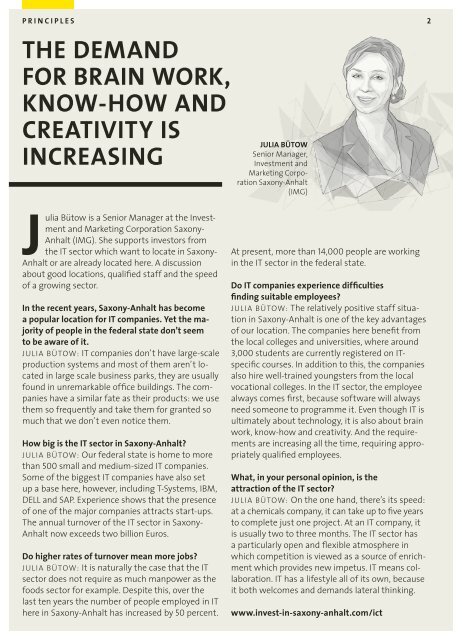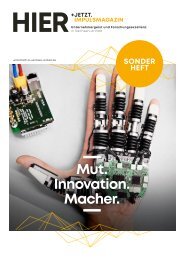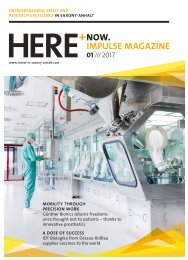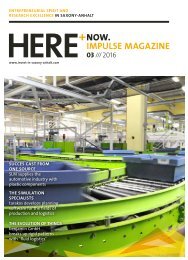HERE+NOW.IMPULSE MAGAZINE /// 01/2016
HERE IT CREATES FUTURE. Over the years to come, digitalisation will make big changes to our lives. Whether it is industry, handicrafts or the service sector, all will have to adapt to it at high speed. The opportunities provided by digitalisation are just as great as the pressure to create innovations. For this reason, information and communications technologies have been defined as an important market of the future in the Saxony-Anhalt Regional Innovation Strategy 2014 – 2020. But it isn’t just the world of business which is facing a digital transformation, the world of public administration is as well. For companies and citizens that means user friendliness – in terms of ease of access, transparent processes as well as flexibility due to time and location independent administrative services. Increasing digitalisation requires more digital education. In recent years, the development of the internet has been so rapid that the requirements in the population have become very different. From primary school pupils to senior citizens, the levels of understanding surrounding technology need to grow, in addition to the ability to apply the knowledge in a correct and beneficial way. For innovations and applications in the digital sphere, the users’ confidence in IT security and data protection are basic requirements. In this respect, the digitalisation of our daily lives will only gain widespread acceptance if IT security keeps in pace with the wider developments. Saxony-Anhalt is well equipped for the digital age. The federal state is already home to many IT companies which have made the conscious decision to locate here and value the excellent local infrastructure. This not only includes sector giants such as T-Systems and SAP, but also cutting-edge start-ups such as UCD+ and marmalade.
HERE IT CREATES FUTURE.
Over the years to come, digitalisation will make big changes to our lives. Whether it is industry, handicrafts or the service sector, all will have to adapt to it at high speed. The opportunities provided by digitalisation are just as great as the pressure to create innovations. For this reason, information and communications technologies have been defined as an important market of the future in the Saxony-Anhalt Regional Innovation Strategy 2014 – 2020.
But it isn’t just the world of business which is facing a digital transformation, the world of public administration is as well. For companies and citizens that means user friendliness – in terms of ease of access, transparent processes as well as flexibility due to time and location independent administrative services.
Increasing digitalisation requires more digital education. In recent years, the development of the internet has been so rapid that the requirements in the population have become very different. From primary school pupils to senior citizens, the levels of understanding surrounding technology need to grow, in addition to the ability to apply the knowledge in a correct and beneficial way.
For innovations and applications in the digital sphere, the users’ confidence in IT security and data protection are basic requirements. In this respect, the digitalisation of our daily lives will only gain widespread acceptance if IT security keeps in pace with the wider developments.
Saxony-Anhalt is well equipped for the digital age. The federal state is already home to many IT companies which have made the conscious decision to locate here and value the excellent local infrastructure. This not only includes sector giants such as T-Systems and SAP, but also cutting-edge start-ups such as UCD+ and marmalade.
Create successful ePaper yourself
Turn your PDF publications into a flip-book with our unique Google optimized e-Paper software.
PRINCIPLES<br />
THE DEMAND<br />
FOR BRAIN WORK,<br />
KNOW-HOW AND<br />
CREATIVITY IS<br />
INCREASING<br />
JULIA BÜTOW<br />
Senior Manager,<br />
Investment and<br />
Marketing Corporation<br />
Saxony-Anhalt<br />
(IMG)<br />
2 3 MARKET OF THE FUTURE INFORMATION AND COMMUNICATION TECHNOLOGY : PROFESSION<br />
DATA FOR<br />
THE CLOUD<br />
INDUSTRY 4.0 AT<br />
THYSSENKRUPP IN SCHÖNEBECK<br />
Julia Bütow is a Senior Manager at the Investment<br />
and Marketing Corporation Saxony-<br />
Anhalt (IMG). She supports investors from<br />
the IT sector which want to locate in Saxony-<br />
Anhalt or are already located here. A discussion<br />
about good locations, qualified staff and the speed<br />
of a growing sector.<br />
In the recent years, Saxony-Anhalt has become<br />
a popular location for IT companies. Yet the majo<br />
rity of people in the federal state don’t seem<br />
to be aware of it.<br />
JULIA BÜTOW: IT companies don’t have large-scale<br />
production systems and most of them aren’t located<br />
in large scale business parks, they are usually<br />
found in unremarkable office buildings. The companies<br />
have a similar fate as their products: we use<br />
them so frequently and take them for granted so<br />
much that we don’t even notice them.<br />
How big is the IT sector in Saxony-Anhalt?<br />
JULIA BÜTOW: Our federal state is home to more<br />
than 500 small and medium-sized IT companies.<br />
Some of the biggest IT companies have also set<br />
up a base here, however, including T-Systems, IBM,<br />
DELL and SAP. Experience shows that the presence<br />
of one of the major companies attracts start-ups.<br />
The annual turnover of the IT sector in Saxony-<br />
Anhalt now exceeds two billion Euros.<br />
Do higher rates of turnover mean more jobs?<br />
JULIA BÜTOW: It is naturally the case that the IT<br />
sector does not require as much manpower as the<br />
foods sector for example. Despite this, over the<br />
last ten years the number of people employed in IT<br />
here in Saxony-Anhalt has increased by 50 percent.<br />
At present, more than 14,000 people are working<br />
in the IT sector in the federal state.<br />
Do IT companies experience difficulties<br />
finding suitable employees?<br />
JULIA BÜTOW: The relatively positive staff situation<br />
in Saxony-Anhalt is one of the key advantages<br />
of our location. The companies here benefit from<br />
the local colleges and universities, where around<br />
3,000 students are currently registered on ITspecific<br />
courses. In addition to this, the companies<br />
also hire well-trained youngsters from the local<br />
vocational colleges. In the IT sector, the employee<br />
always comes first, because software will always<br />
need someone to programme it. Even though IT is<br />
ultimately about technology, it is also about brain<br />
work, know-how and creativity. And the requirements<br />
are increasing all the time, requiring appropriately<br />
qualified employees.<br />
What, in your personal opinion, is the<br />
attraction of the IT sector?<br />
JULIA BÜTOW: On the one hand, there’s its speed:<br />
at a chemicals company, it can take up to five years<br />
to complete just one project. At an IT company, it<br />
is usually two to three months. The IT sector has<br />
a particularly open and flexible atmosphere in<br />
which competition is viewed as a source of enrichment<br />
which provides new impetus. IT means collaboration.<br />
IT has a lifestyle all of its own, because<br />
it both welcomes and demands lateral thinking.<br />
www.invest-in-saxony-anhalt.com/ict<br />
Big data: hundreds of data are measured,<br />
stored and analysed during production.

















